Thatchergate was the colloquial title of a hoax perpetrated by members of the anarcho-punk band Crass during the aftermath of the 1982 Falklands War. Using excerpts from speeches by Prime Minister of the United Kingdom Margaret Thatcher and President of the United States Ronald Reagan, a recording was spliced together which purported to be a telephone conversation between the two leaders. During the course of the tape, Reagan seems to state his intention to use Europe as a battle front to show the Soviet leaders the US's resolve in a nuclear conflict, whilst Thatcher appears to imply that HMS Sheffield was deliberately sacrificed to escalate the Falklands War.
When the recording first surfaced into the public domain in 1983, the United States Department of State considered it to be propaganda produced by the Soviet KGB, a story reported by both the San Francisco Chronicle [1] and The Sunday Times . [2] However, coverage of the tape by the UK broadsheet The Observer in January 1984 identified the true source as Crass. [3] Crass have stated that great care was taken to ensure their anonymity, and that to this day it is a mystery as to how Observer journalists traced the hoax back to them. [4]
In January 2014, official government documents were released to the National Archives revealing the concerns of the UK's Secret Intelligence Service (MI6). A Foreign Office adviser's letter to Thatcher said: "This looks like a rather clumsy operation. We have no evidence so far about who is responsible. ...SIS doubt whether this is a Soviet operation. It is possible that one of the Argentine intelligence services might have been behind it; or alternatively it might be the work of left-wing groups in this country." [5]
Excerpts of the recording can be heard in the Crass track "Powerless with a Guitar" on the compilation LP Devastate to Liberate (Yangki - 1985 - Yangki 1). The full recording was later released on the expanded Crassical Collection edition of the group's best of album Best Before 1984 .

Margaret Hilda Thatcher, Baroness Thatcher, was a British stateswoman and Conservative politician who was Prime Minister of the United Kingdom from 1979 to 1990 and Leader of the Conservative Party from 1975 to 1990. She was the longest-serving British prime minister of the 20th century and the first woman to hold the position. As prime minister, she implemented economic policies known as Thatcherism. A Soviet journalist dubbed her the "Iron Lady", a nickname that became associated with her uncompromising politics and leadership style.

Yuri Vladimirovich Andropov was a Soviet politician who was the sixth leader of the Soviet Union and the fourth General Secretary of the Communist Party of the Soviet Union, taking office in late 1982 and serving until his death in 1984.

The Reagan Doctrine was a United States strategy implemented by the Reagan Administration to overwhelm the global influence of the Soviet Union in the late Cold War. As stated by US President Ronald Reagan in his State of the Union address on February 6, 1985: "We must not break faith with those who are risking their lives—on every continent from Afghanistan to Nicaragua—to defy Soviet-supported aggression and secure rights which have been ours from birth." The doctrine was a centerpiece of United States foreign policy from the early 1980s until the end of the Cold War in 1991.

Jeane Duane Kirkpatrick was an American diplomat and political scientist who played a major role in the foreign policy of the Ronald Reagan administration. An ardent anticommunist, she was a longtime Democrat who became a neoconservative and switched to the Republican Party in 1985. After serving as Ronald Reagan's foreign policy adviser in his 1980 presidential campaign, she became the first woman to serve as United States Ambassador to the United Nations.

Best Before 1984 is a compilation of Crass' singles and other tracks, released in 1986, including lyrics and a booklet which details the history of the band in their own words. The album was named in reference to the notion that 1984 was the band's "'sell by date", the year that they had often publicly stated that they would split up. Indeed, the band ceased gigging and recording in that year.

The Special Relationship is a term that is often used to describe the political, social, diplomatic, cultural, economic, legal, environmental, religious, military and historic relations between the United Kingdom and the United States or its political leaders. The term first came into popular usage after it was used in a 1946 speech by former British Prime Minister Winston Churchill. Both nations have been close allies during many conflicts in the 20th and the 21st centuries, including World War I, World War II, the Korean War, the Cold War, the Gulf War and the war on terror.

Oleg Vladimirovich Penkovsky, codenamed Hero and Yoga was a Soviet military intelligence (GRU) colonel during the late 1950s and early 1960s. Penkovsky informed the United States and the United Kingdom about Soviet military secrets, including the appearance and footprint of Soviet intermediate-range ballistic missile installations and the weakness of the Soviet intercontinental ballistic missile (ICBM) program. This information was decisive in allowing the US to recognize that the Soviets were placing missiles in Cuba before most of them were operational. It also gave US President John F. Kennedy, during the Cuban Missile Crisis that followed, valuable information about Soviet weakness that allowed him to face down Soviet leader Nikita Khrushchev and resolve the crisis without a nuclear war.

Sir Roger Henry Hollis was a British intelligence officer who served with MI5 from 1938 to 1965. He was Director General of MI5 from 1956 to 1965.
Able Archer 83 was a military exercise conducted by NATO that took place in November 1983, as part of an annual exercise conducted in November 1983. It simulated a period of heightened nuclear tensions between NATO and the Warsaw Pact, leading to concerns that it could have been mistaken for a real attack by the Soviet Union. The exercise is considered by some to be one of the closest moments the world came to nuclear war during the Cold War. The purpose of the exercise, like previous years, was to simulate a period of conflict escalation, culminating in the U.S. military attaining a simulated DEFCON 1 coordinated nuclear attack. The five-day exercise, which involved NATO commands throughout Western Europe, was coordinated from the Supreme Headquarters Allied Powers Europe (SHAPE) headquarters in Casteau, Belgium.
This is an overview of the Crass Records discography. (NB, dates refer to initial UK releases, many of these records have since been re-issued in CD format)
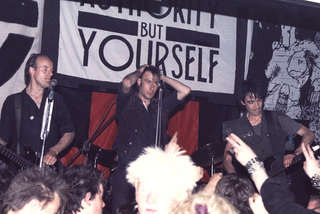
Crass were an English art collective and punk rock band formed in Epping, Essex in 1977 who promoted anarchism as a political ideology, a lifestyle and a resistance movement. Crass popularised the anarcho-punk movement of the punk subculture, advocating direct action, animal rights, feminism, anti-fascism and environmentalism. The band employed and advocated a DIY ethic in its albums, sound collages, leaflets and films.
The cultural impact of the Falklands War spanned several media in both Britain and Argentina. A number of films and television productions emerged from the conflict. The first Argentine film about the war was Los chicos de la guerra in 1984. The BBC drama Tumbledown (1988) tells the story of a British officer paralysed from a bullet wound. The computer game Harrier Attack (1983) and the naval strategy game Strike Fleet (1987) are two examples of Falklands-related games. A number of fictional works were set during the Falklands War, including in Stephen King's novella The Langoliers (1990), in which the character Nick Hopewell is a Falklands veteran. The war provided a wealth of material for non-fiction writers; in the United Kingdom (UK) an important account became Max Hastings and Simon Jenkins' The Battle for the Falklands.
American foreign policy during the presidency of Ronald Reagan (1981–1989) focused heavily on the Cold War which shifted from détente to confrontation. The Reagan Administration pursued a policy of containment and rollback with regards to communist regimes. The Reagan Doctrine operationalized these goals as the United States offered financial, logistical, training, and military equipment to anti-communist opposition in Afghanistan, Angola, and Nicaragua. He expanded support to anti-communist movements in Central and Eastern Europe.
The bibliography of Ronald Reagan includes numerous books and articles about Ronald Reagan. According to J. David Woodard, a political science professor, more than 11,000 books on Reagan have been published.
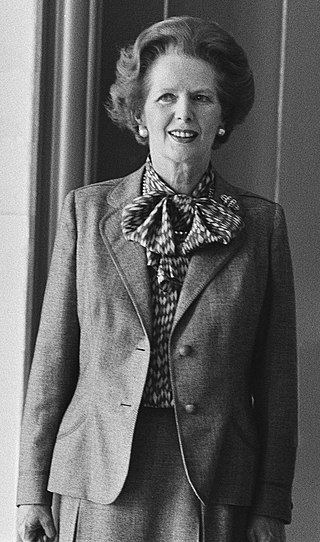
Margaret Thatcher's term as the Prime Minister of the United Kingdom began on 4 May 1979 when she accepted an invitation of Queen Elizabeth II to form a government, and ended on 28 November 1990 upon her resignation. She was elected to the position in 1979, having led the Conservative Party since 1975, and won landslide re-elections for the Conservatives in 1983 and 1987. She gained intense media attention as Britain's first female prime minister, and was the longest-serving British prime minister of the 20th century. Her premiership ended when she withdrew from the 1990 Conservative leadership election. While serving as prime minister, Thatcher also served as the First Lord of the Treasury, the Minister for the Civil Service and the Leader of the Conservative Party.
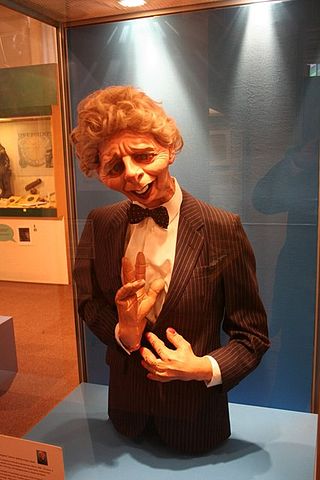
Margaret Thatcher was Prime Minister of the United Kingdom from 1979 to 1990. Her portrayal in the arts and popular culture has been mixed. In the words of one critic she attracted "musical opprobrium like no other British political leader". Such opinion is divergent from mainstream opinion polling which tends to place her as the most popular British prime minister since Winston Churchill.

The Iron Lady is a 2011 biographical drama film based on the life and career of Margaret Thatcher, a British politician who was the longest-serving Prime Minister of the United Kingdom of the 20th century and the first woman to hold the office. The film was directed by Phyllida Lloyd and written by Abi Morgan. Thatcher is portrayed primarily by Meryl Streep, and, in her formative and early political years, by Alexandra Roach. Thatcher's husband, Denis Thatcher, is portrayed by Jim Broadbent and by Harry Lloyd as the younger Denis. Thatcher's longest-serving cabinet member and eventual deputy, Geoffrey Howe, is portrayed by Anthony Head.

The appearance of Ronald Reagan in music includes mentions and depictions of the actor-turned-politician in songs, albums, music videos, and band names, particularly during his two terms as President of the United States. Reagan first appeared on a few album covers during his time as a Hollywood actor, well before his political career. During the 1960s, folk, rock, and satirical musicians criticized Reagan in his early years as Governor of California for his red-baiting and attacking of the Berkeley-based Free Speech Movement. In the 1980s, songs critiquing Reagan became more widespread and numerous once he ascended to national office and involved himself in the renewal of the Cold War, the nuclear arms race, social conservatism, right-wing evangelicalism, and his economic policies in relation to low-income people. While references to Reagan during his presidency appear in pop music, his presence in song lyrics and on album covers is often associated with the hardcore punk counter-culture of the 1980s.
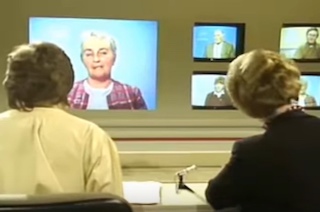
An exchange on 24 May 1983 between Diana Gould, an English schoolteacher and former Women's Royal Naval Service meteorological officer, and British prime minister Margaret Thatcher was voted in 1999 as one of the most memorable moments in British television. Appearing as a member of the public on BBC Nationwide's On the Spot live election special, Gould confronted Thatcher over the sinking of the Belgrano, an Argentine warship, during the 1982 Falklands War between the United Kingdom and Argentina.
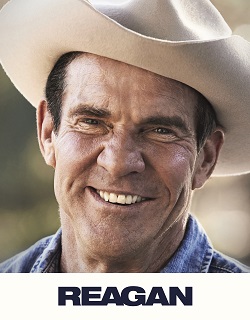
Reagan is a 2024 American biographical drama film directed by Sean McNamara and written by Howard Klausner, based on Paul Kengor's 2006 book The Crusader: Ronald Reagan and the Fall of Communism. The film stars Dennis Quaid as President Ronald Reagan alongside Penelope Ann Miller and Jon Voight, with Robert Davi and Lesley-Anne Down in supporting roles.
We were overcome with a mixture of fear and elation, should we or should we not expose the hoax? Our indecision was resolved when a journalist from The Observer contacted us in relation to 'a certain tape'. At first we denied knowledge, but eventually decided to admit responsibility. We had been meticulously careful in the production and distribution of the tape to ensure that no one knew about our involvement. How The Observer got hold of information that led to us is a complete mystery. It acted as a substantial warning, if walls did indeed have ears, how much more was known of our activities?